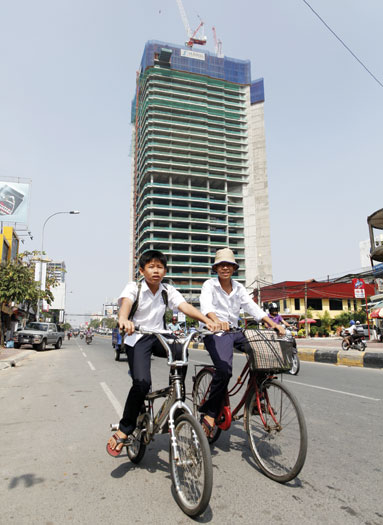Malcolm McVicar, vice-chancellor and president of the University of Central Lancashire (UCLan), has spent the past three to four years nurturing a project to open a full-scale campus in Thailand.
“This will be the first British university here. We chose Thailand because the country is a good centre to reach other parts of the region and is also an attractive place for European students to study in Asia.”
“Thailand’s policy is to establish the country as a regional centre for education. This means a significant expansion of facilities to attract students from around the world.”
“We plan to provide a total ‘British university’ experience here for graduate and post-graduate studies with a range of programmes taught in English – the same programmes we deliver in the UK. It’s not our first international campus as we’re going to open our new campus in Cyprus in about one month’s time.”
“Here in Thailand, we are required by Thai law to have a local partner so we’ve established a 51/49 per cent joint venture. The campus will be situated about 20 miles [32 kilometres] from Bangkok in Samut Sakhon province next to the golf course and housing estate of Best Group of Companies, our Thai partner.”
“Besides teaching, there will be research and other facilities at the Thai campus. More importantly, there will be linkages with industries and businesses as universities have a key role to play in economic generation and helping the Thai economy to get stronger.”
“Uclan dates back to 1828. It was an institute in those days. It became a polytechnic in the early 1970s and a full university about 20 years ago. Now, we have about 35,000 students, with a lot of international students from China, India, Pakistan and Thailand.”
“We have some good students from Thailand, particularly in fashion and design. We will focus on providing English programmes, IT, engineering, business management, fashion and design. The initial programmes will be tailored to meet the Thai and regional economic requirements.”
“We will not compete with Thai universities, but complement them as we want to offer the British experience with programmes taught by a mixture of local and UK staff so students can study at a British university without leaving Thailand.”
“The young people who will graduate in the next few years will be working in the global economy so one of the key things they need to have is global experience. We want the students to study a year in Britain, a year in Thailand, and a year in Cyprus.”
“The ability to move from one campus to another in the same courses and the same university will be crucial.”
“In phase one, we want to build a student population of 5,000. Of this number, about 20 per cent will come from Europe, as many have expressed interest in coming here. They know that if they are going to get a good career they have to show international experience.”
“Studying for a year in another country makes them more marketable as a graduate, and Thailand is an attractive place to come and live. Earlier, we looked at Singapore and Malaysia but found they were too crowded with [education] provisions.”
“Over time, I think Thailand can build itself as a first-class higher-education centre, like Singapore and Malaysia. Besides Thailand, we also expect students from other Asean countries to come to our campus in Thailand, such as those from Vietnam, Cambodia, Laos and Myanmar.”
“The fees will be very competitive and much cheaper than going to study in the UK. The project in Thailand will cost Bt1 billion and we have a 49 per cent stake,” he says.
Source: http://news.asiaone.com/News/AsiaOne%2BNews/Asia/Story/A1Story20120712-358663.html

